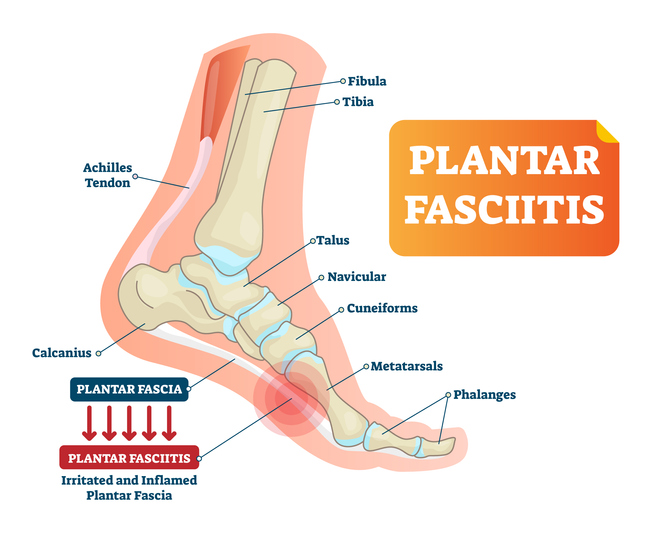Does foot pain accompany those first few steps when you get up in the morning? If so, you may have plantar fasciitis. The plantar fascia is the largest ligament in our body. This ligament runs from the bottom of your fore-foot and attaches to the calcaneal heel bone. It’s estimated that 1 out of 10 people during their lifetime will experience heel pain from plantar fasciitis and is most common among people 40-60 years old.
As we get older, the natural fat padding on the bottom of our feet starts to dissipate. The fat padding acts like a cushion protecting the plantar fascia ligament and tendons on the bottom of the foot. When the cushion thins out, your entire body weight is directly over the plantar fascia with each step. Repetitive strain from running, walking and jumping forms micro-tears and scar tissue, causing the plantar fascia to become painfully inflamed.
Symptoms
Symptoms include a sharp stabbing pain along and near the heel bone. Pain is the worst in the morning and improves as you continue to walk throughout the day, only to increase again as you stand up from a sitting or resting position. This makes normal activities such as walking and running very difficult. Often times, the foot will be stiff and hypersensitive. The foot will at times feel swollen, tender and warm to the touch.
Treatment
The treatment goal for plantar fasciitis is to reduce the inflammation and prevent abnormal pressure over the ligament. At-home treatments can include massaging the heel with ice, as well as various home stretching exercises. Your physician will often refer you to physical therapy for stretching exercises as well as deep tissue massage.
Your doctor may also prescribe anti-inflammatory medications. Oftentimes, cortisone injections are helpful. Changing shoes that are wider or cushioned can reduce irritation. Custom orthotics are also made to control the joint motion and correct biomechanical abnormalities that decrease strain to the plantar fascia. When all else fails, surgery is performed on the chronically inflamed plantar fascia.

